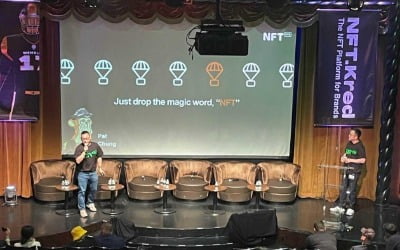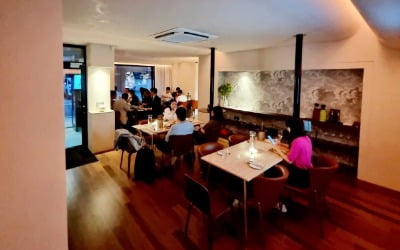I thought it was an ordinary restaurant... "We will help you make…
언론사(미디어) Korea Economy
글쓴이 Daeun Choi
보도일 2022-06-29
2,378회
작성일 22-06-29 10:17
본문
Interview with the founders of the RSV project, Kim Chan-hyeok and Jeong Dong-ik
Web 3.0 restaurant based on NFT membership
Creating an NFT-based community.. Operating as a member system
Starting with the 1st store in Dogok-dong, 10 stores will be released by 2026
“If the OO Tteokbokki Apgujeong branch is a place my friends do, they do better and inform people about it. I want to create a space where fruits are shared fairly and each other is considered a member of the community.”
In addition to art and fashion, cases of using non-fungible tokens (NFTs) are attracting attention in the domestic food and beverage (F&B) industry. The 'RSV Project' (RSV), which participated as a speaker at the world's largest NFT event 'NFT NYC 2022' held last week in the United States, is one of them.

How do you introduce the concept of Web 3.0 to restaurants? First of all, these goals are to form a community based on NFTs. It supports member-only reservations, member search, and web (app) that allows meeting suggestions, as well as RSV Club Day and member-specific NFT exhibitions in the space. It is a 'space business' based on a restaurant and a 'club room for members of society'.

The RSV founding team participated as a speaker at NFT.NYC held in New York on the 23rd.
RSV is a project aiming for a Web 3.0 restaurant based on NFT membership. CEO Kim Chan-hyeok, who worked in the food service business, and Jeong Dong-il (34), team leader who worked for a foreign platform company, joined forces and started it last May. The name of the project was derived from 'reserve', which refers to wines that have been aged for a long time. The intention is to provide members with a wine-like experience that gets deeper and richer as it ages.
In an interview with the Korea Economic Daily in New York last year, the two founders said, "I think Web 3.0 should only be introduced in areas where it is absolutely necessary, but the restaurant industry is where (Web 3.0) is absolutely necessary."
“This is because members can interact and create new values through food and space experiences,” he said.
Web 3.0, which utilizes blockchain technology, focuses on 'decentralization' and 'interoperability'. It is also called the Internet system that will implement the metaverse. It is characterized by the fact that ownership can be secured with NFTs containing encryption technology.

The first RSV Space in Dogok-dong, Seoul. Currently operating as a Spanish restaurant, RSV's NFT membership system will be introduced from the second half of the year. Courtesy of RSV
They said, “No matter how much the metaverse and Web 3.0 era come, people are most hungry.”
"I think food and NFT as an intermediary device make people-to-people exchanges easier," he said.
RSV began with the idea of innovating the existing work environment. This is because it was a field where it was difficult for everyone to benefit from the growth of both the platform and the restaurant business that they had been involved in, and there were some limits to their growth.
CEO Kim said, "We will advocate for 'DAO' (DAO · Decentralized Autonomous Organization) where everyone, including employees, chefs, and serving managers, can receive rewards as members of the community and voice one voice." It allows holders (NFT holders) to express their opinions about various events, restaurant menus, music, etc. Their explanation is that not only the founders, but also chefs, staff, and guests can act as holders and act as a kind of shareholder.
RSV cited simplicity and transparency as differences from existing restaurant memberships. Unlike the membership of existing restaurants, NFT is a concept that goes in when you buy and comes out when you sell. “There is no need to go to the homepage and write down personal information, just buy NFTs from the community you want.”
There are as many concerns as expected. This is because the virtual asset market is in a recession and there are cultural and technological entry barriers to NFT itself. Nevertheless, they said, "Isn't it strange to ask whether the Internet is good or bad?"
"The skills that have already been created need to be developed for the better," he says.
